German families open their doors and hearts to refugees
Categories: Europe
By Pictolic https://pictolic.com/article/german-families-open-their-doors-and-hearts-to-refugees.htmlWhile other European countries have tightened their border controls, Germany opened its doors to more than 270,000 refugees in September alone (for the whole of 2014, 200,000 were registered). The country's response has not been ideal - asylum seekers have had to wait a long time to register, sometimes sleeping on the streets and still dreaming of a better life. Conservative parts of Germany, especially the east, were not too friendly and faced a wave of protests against migrants. But the majority still followed the call of Chancellor Angela Merkel, who said: "If we now have to start apologizing for showing a friendly face in response to an emergency, then this is not my country."
In September, Danish photographer Joakim Eskildsen and Time reporter Naina Bajekal spoke in Berlin with many Syrian and Afghan refugees forced to leave their homes. “The people we met are just like you and me, only their houses were destroyed and their lives there became impossible,” says Eskildsen. Here are their stories.
(Total 11 photos)
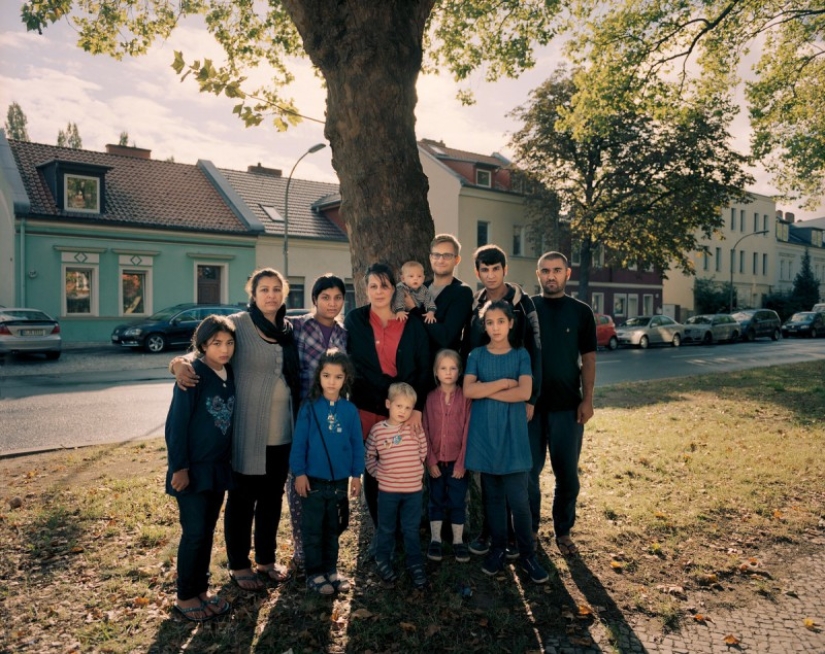 Source: time.com
Source: time.com
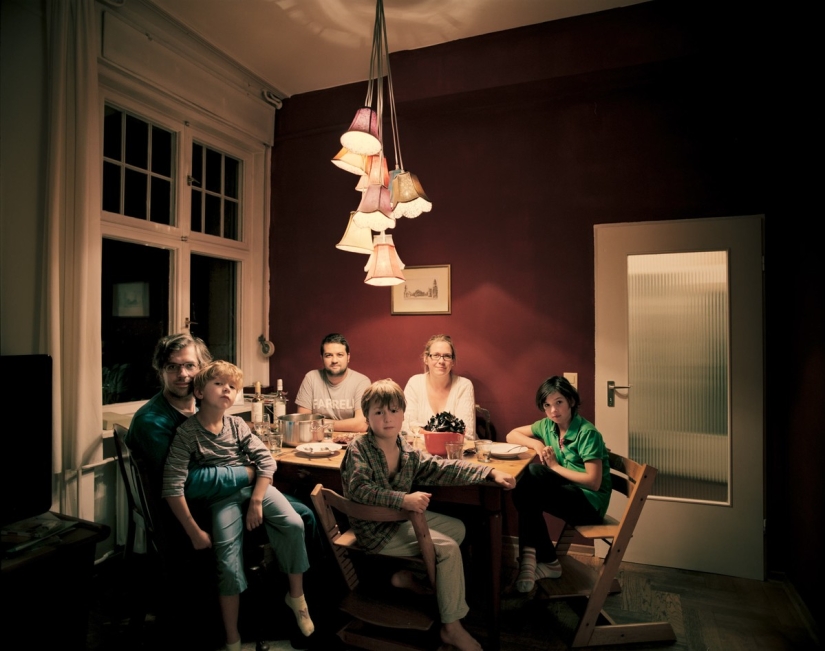
1. Abdel Rman Alali (back left), 29, was a pediatrician in Hama, Syria. He fled Assad's forces in May 2014 and endured a seven-month journey that included a stay in a St. Petersburg prison and four months in Ukraine before he finally made it to Berlin last December.
In March, Judit Rojoll (back center), a 38-year-old physiotherapist, met Alali through a friend who works at the shelter where he lived. She invited him to live in a spare room in her house. Now Alali speaks almost fluent German and already has two job offers from local hospitals. “I consider them my German family,” says Alali.
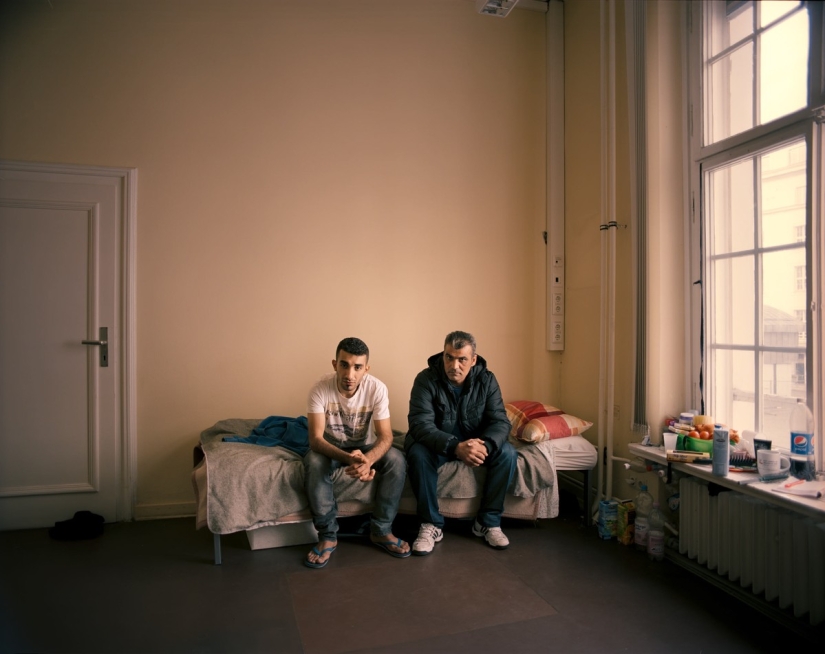
2. Alaa Maas (left), 23, with her cousin, Ibrahim Maas, 35, at the Wilmersdorf refugee shelter in Berlin. Both are from Aleppo, Syria, and have yet to receive their documents.
“Before the war in Syria, I was very happy. I had enough of everything in my life,” says Ibrahim. “Now I have nothing. My brother is not. My mother is in a small border village where it is not safe. She can't walk, so she can't get to Turkey. All I want to know is how can I move my wife and family out of Turkey. No one tells me about these procedures.”
“Of course I want to stay here and build my life,” says Alaa. “I have no hope of returning home.”
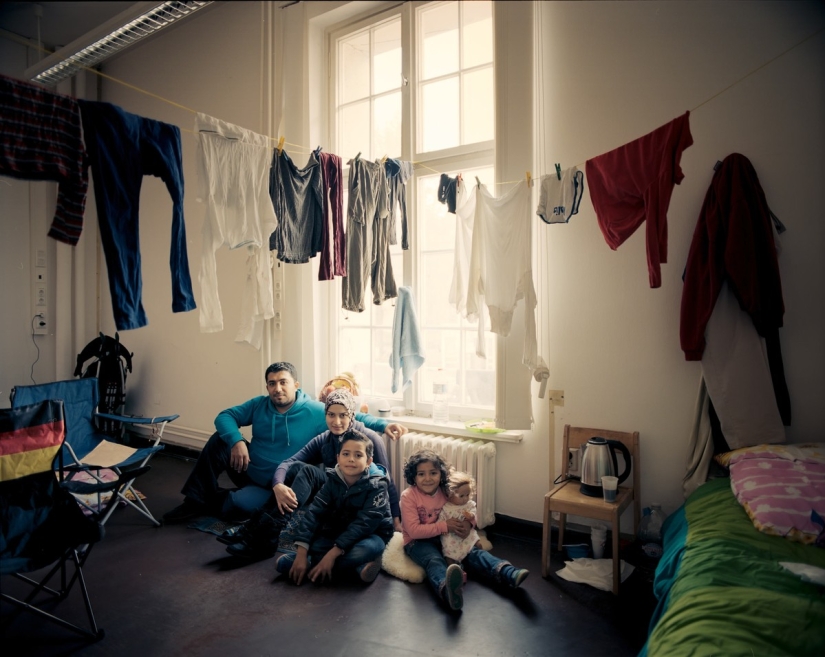
3. Hasan Maas, 32, with his wife Nahed Sikkarit, 24, and their two children, Mohammed, 7, and Mayar Alhelva, 4, at the Wilmersdorf refugee shelter in Berlin, where they have been living for more than a month. They decided to leave and join friends in Germany after a shell exploded 50 meters from their home in Aleppo, Syria.
“When we saw the bodies on the street, we couldn't believe that this could happen to our children,” Maas says. “Our journey was like dying,” recalls Sikkarit. “We were hugging the kids, wondering how we would get there.” The family was fingerprinted in Hungary but hope they can stay in Germany as Berlin no longer sends refugees back to their countries of origin.
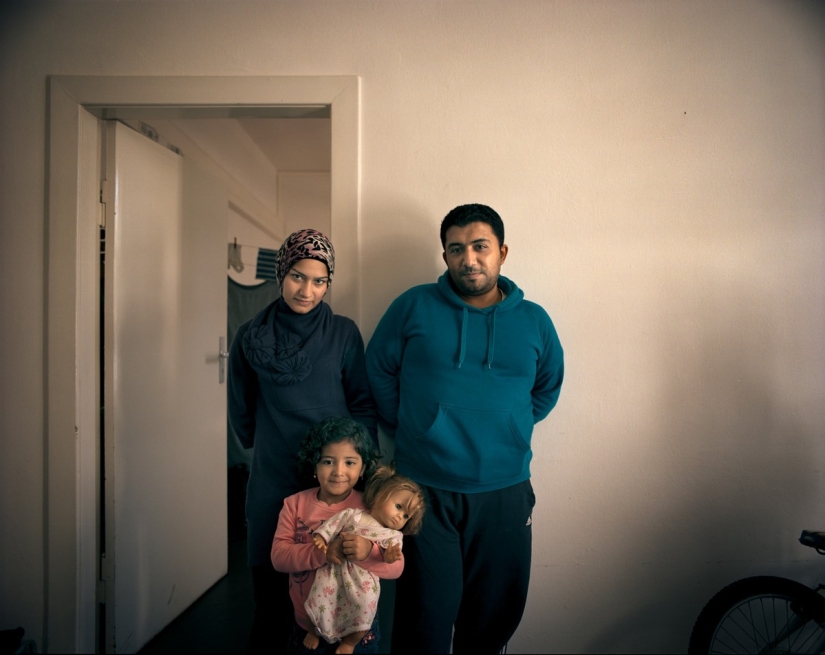
4. Hassan Maas owned a small cell phone shop in Aleppo, his wife used to be a hairdresser. They would like to work in Germany, but are still waiting for paperwork and living in a shelter. For now, they're just happy to find cover. “We thank Allah that the rockets and bombs are gone and we are safe,” Maas says. Their daughter has a reason to smile too - she lost her favorite doll on a boat in Greece, but now she has a new one.
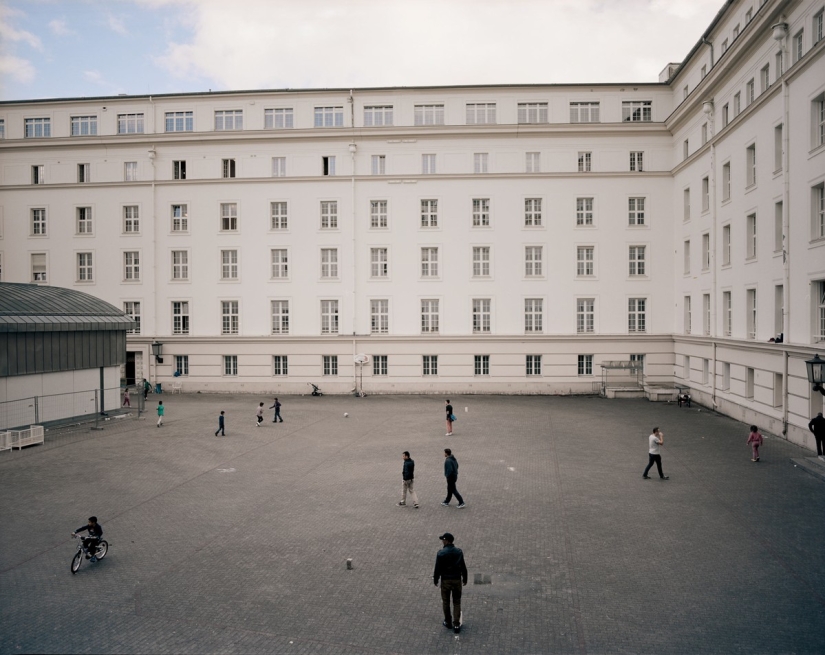
5. Children play in the courtyard of the former city hall in Wilmersdorf, Berlin. Volunteers helped turn it into a refugee reception center in mid-August.
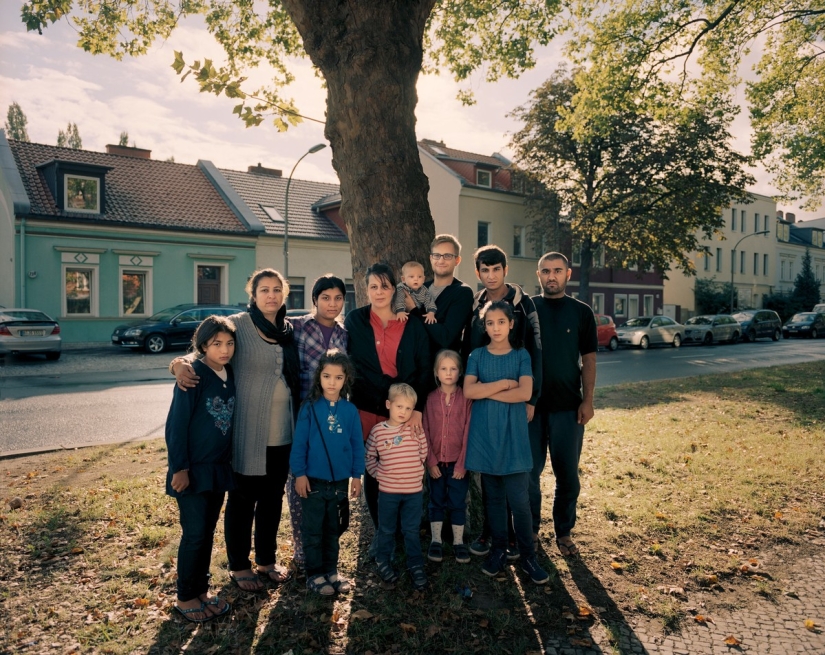
6. Marya Sharifi's husband was killed by the Taliban three years ago. When her 16-year-old son Rohen was threatened, Marya decided to sell the house and run away. “We are tired of being afraid,” Marya says. “I just wanted my kids to be able to go to school safely.” When they arrived in Berlin on August 28, the refugee registration center was closed for the weekend. That night, teacher Katie Tennstedt-Horn and her husband Tim Florian Horn, director of the Berlin Planetarium, heard on the news that refugees were sleeping on the street. Despite the couple having three small children, Kati drove to the center and returned with all seven members of Sharifi's family. They lived together for five days until they found shelter. "They've been through a lot, but they've been such a tight-knit family," says Tim.
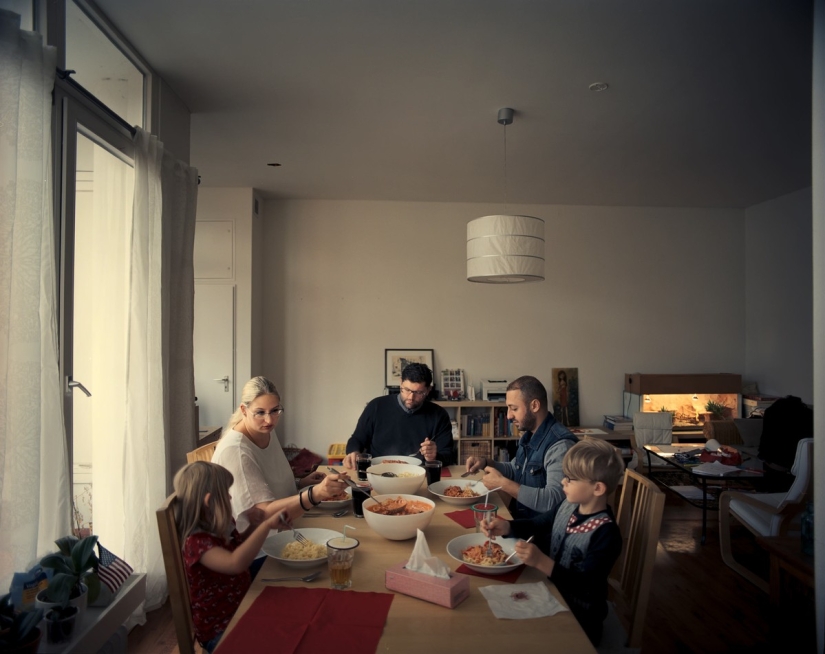
7. Bashar al-Rifai (second from right), 30, fled the Syrian city of Homs and arrived in Berlin in August. He was unable to find a hostel that would accept government vouchers issued to him, but was lucky enough to meet Fabian Rick (center), who asked his children to share one room again and invited al-Rifai to his Berlin apartment.
“I would never even consider leaving Syria before the war. But somehow I lost everything,” says al-Rifai. “The people here are so kind and very helpful. When they find out that you are a Syrian, that you are a refugee, they open their hearts. I never thought that someone like Fabian could do so much for me. I already feel German. I feel right at home".
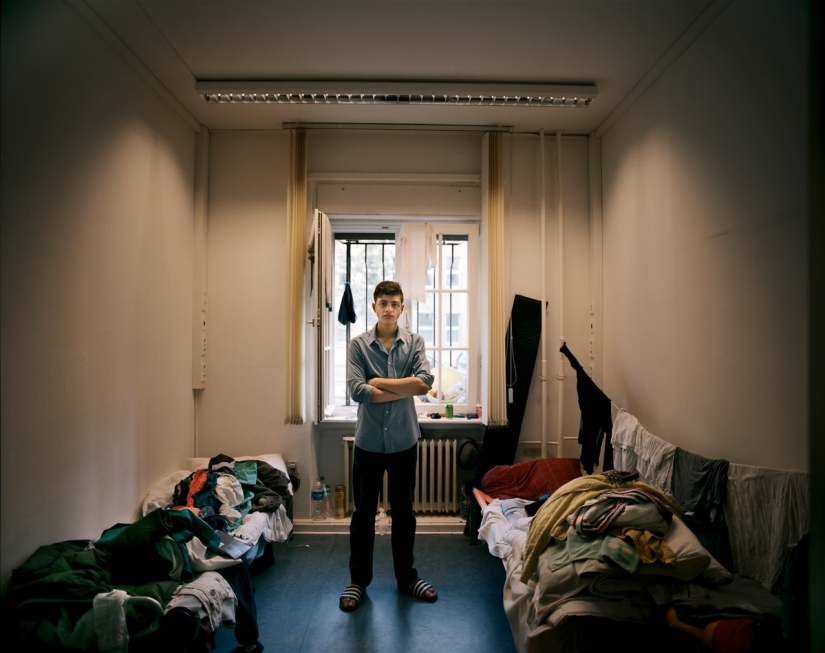
8. Abdelkader Jbili, aged 16, arrived in Berlin in mid-August after a three-month journey. “I didn’t want to put my family in danger,” he explains his decision to leave without his parents and younger siblings. Instead, he fled with his uncle. Now Jbili also lives in the Wilmersdorf refugee shelter in Berlin. “I just called my father and found out that his store was bombed today. They are not safe in Aleppo,” he said. “But three days ago I received my documents and I can stay. Since I am a minor, I will now be able to apply for reunification and relocate my family. I hope we can all stay in Germany because the people here are good.”
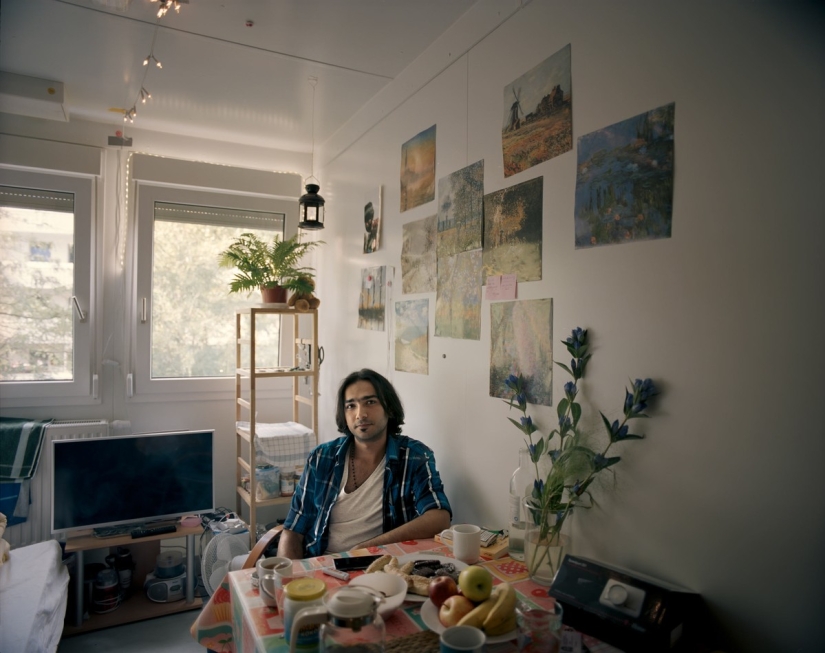
9. Mohammed Haj Ali, 26, from Aleppo, lives in a long-term refugee shelter in Buch, a northeastern suburb of Berlin. Before the war, he and his brothers owned three restaurants in Aleppo and Homs. He worked to pay for a business education. Facing the prospect of being recruited into Assad's army, he fled the country in February 2012, living in Libya, Egypt and Turkey until he arrived in Germany in November 2014. Since he was fingerprinted in Hungary, his asylum application was rejected. Now that Germany has changed its laws, it is not known if he will be able to stay, despite the fact that he has been living in the country for almost a year.
“There is only darkness ahead. I don't know what the future holds for me. People like me came here and got completely lost,” he says. - After a while, you stop missing someone or something. You breathe, the days go by, that's all. I have no more hope. The truth is that when you have hope, you are vulnerable.”
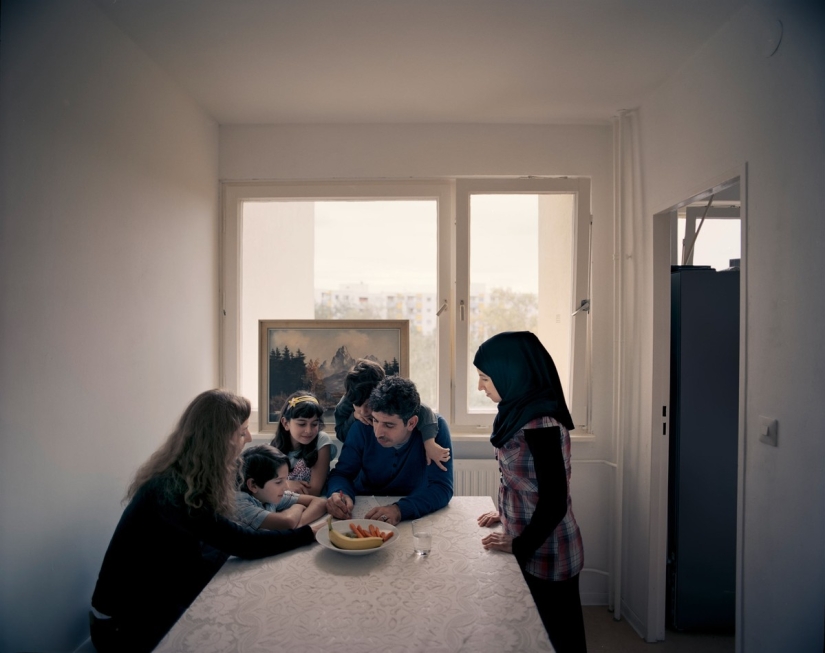
10. Britta Leben (left), a 27-year-old graduate student, helps Zakaria Edelby (center), 30, with German classes. Edelbi arrived in Berlin in August 2014, leaving his wife and three children in Aleppo. He was able to reunite with them in March 2015 after months of getting visas.
Leben first met Edelby in May through Beginn Nebenan Berlin, an organization that brings locals together with refugees. “I just wanted to get to know the people we share this city with,” she says. “And Zakaria and his family are so open and always fun to be around.” At the end of August, the Edelby family moved from the orphanage to their own apartment in Spandau in West Berlin. The children now go to a local school and already speak some German. Edelbi said that he fears for the future of Syria, but finally he can not be afraid for the safety of his children.
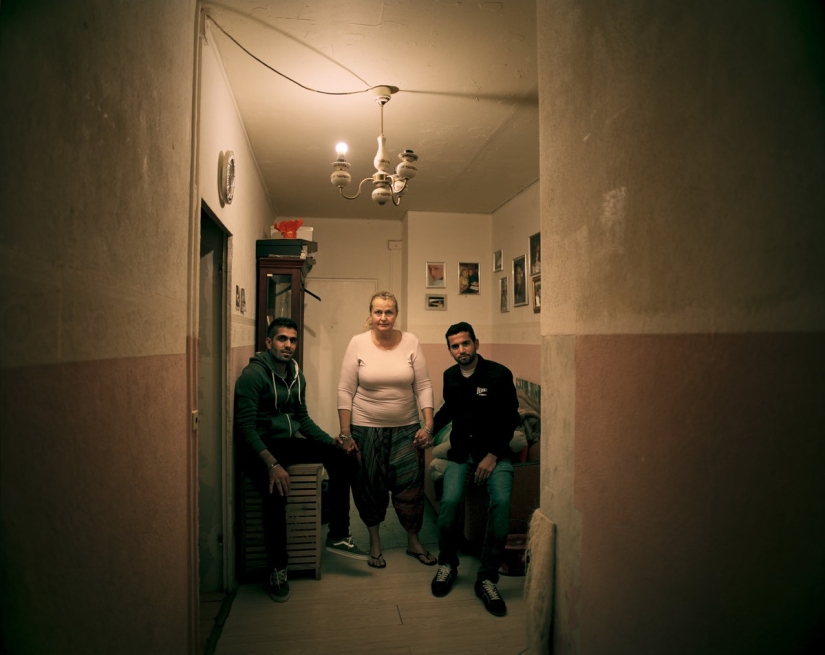
11. Marlene Allaoui (center) found Abdullah Farhan, 26, and Mahmoud Abu Horan, 27, sleeping on the streets of Berlin - they also couldn't find a hostel that accepted their vouchers. Farhan, a former school teacher, fled ISIS; and Abu Horan from being recruited into Assad's army.
“Is it possible for people to come here only to face another hell? says Marlene, who has given shelter to nine more refugees in her north Berlin apartment since early August. “I had to do something!”
Keywords: Refugees | Germany | Family
Post News ArticleRecent articles

It's high time to admit that this whole hipster idea has gone too far. The concept has become so popular that even restaurants have ...

There is a perception that people only use 10% of their brain potential. But the heroes of our review, apparently, found a way to ...
Related articles

Millions of people around the world buy lottery tickets in the hope of winning a happy life. They dream of luxury cars, luxury ...

Many people mistakenly believe that love is "butterflies in the stomach", passionate kisses in the rain, walks in the late evenings ...

American writer Margaret Mitchell wrote only one novel — "gone with the wind". But it provided the woman's place in the ...

New Year's is a time to surprise and delight loved ones not only with gifts but also with a unique presentation of the holiday ...